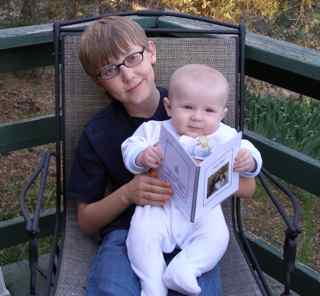The following article comes from abcteach friend and colleague, Shara Lawrence-Weiss. An educator, business owner, and dedicated mom, Shara provides us tangible examples on how parents can develop language skills throughout early childhood.
 We know from countless research studies: language affects reading. Language is at the very core of everything we do. A language-rich home generally produces successful readers. So, in honor of Reading Month, I’ve listed out a few ways that you can help your child(ren) develop strong language skills.
We know from countless research studies: language affects reading. Language is at the very core of everything we do. A language-rich home generally produces successful readers. So, in honor of Reading Month, I’ve listed out a few ways that you can help your child(ren) develop strong language skills.
Making Statements and Asking Questions
Kids love to hear you talk, right from birth. “Good morning, my love. How did you sleep?” “Let’s go for a walk now. I’ll put you into the stroller and we’ll go visit the park.” “Look at the bird!” “Do you see the kids playing and swinging? They are having so much fun!” Everything you say to your child is being taken in and pondered.
Music
Research clearly indicates that music and literacy go hand in hand. In our home we sing, dance, memorize lyrics, sing in the car and at home and more. We love music and we play songs every single day. We move around to the music and we hold the baby (while singing and dancing) so she can enjoy the experience, too. All four of my kids love, love, love music.
Grocery Shopping
Talk while grocery shopping. “Let’s go to ________ today for some groceries.” “What shall we buy? Let’s look over our list.” “The eggs are on sale. Oh good!” “What fruit should we get today?” Point out store signs, as well, clearly speaking the words that you see.
Make Up Songs
Write your own songs. Kids really get a kick out of this and you don’t have to be great at it. I often make up songs while we are cooking, walking, or driving. Even at night, before sleeping, I make up silly songs that encourage my kids to laugh. I might make up a song about their pajamas, shoes, bed spread, school or pet dog – whatever!
Make Up Stories
A while back I began making up stories with my daughter. She said, “I don’t feel like reading a book tonight so can you just tell me your own story?” I made up a story about a princess who had many lovely dresses – who didn’t want to share. A kind friend helped her locate the dresses after they were stolen and that helped to change the cold heart of the princess (social emotional twist mixed with language development). Whatever your story is about, your kids will like the effort you made!
Read
Make a point to read with your child(ren) every day, based on the family schedule. Kids love to know they can count on a book at night before heading off to dreamland. However, if your work schedule doesn’t allow for this, read in the morning or in the afternoon. Here’s an interesting side note: some prisons run a reading program for their inmates where they have the inmate read books from inside the cell. They tape record the reading and send that to the inmate’s child. Now that’s dedication!
Name Those Toys
When playing with your child you can say, “Oh look at the red ball!” Or, “Let’s play with those colorful Legos now.” Or, “Did you enjoy playing with that yellow truck?” Labeling items is one helpful way to foster language development. Take it a step further and build on your child’s Emotional Intelligence as well: “It made me feel happy to see you playing with that red ball.” Or, “Your sister loves that green frog, too. She likes to snuggle the frog when she is sad.” You may not always think your child is paying attention but I assure you – it’s true. Here is an example: I have four kids. Our youngest is 11 months old. She is already saying quite a few words, in her own way. We can understand the words, though, and we know precisely what she is saying. Every night my son runs over to hug me and I pat his head and say, “Love you!” It’s our ‘little thing.’ Last night he ran over to hug my leg while I was holding the baby. The baby looked down, patted his head and said, “Lub you!” She is paying attention to everything we say and do.
Leave Notes Around
I sometimes leave little notes around our house for my kids. In the bathroom we have a notepad attached to the mirror. I might write, “Good morning!” or “I love you!” I leave notes for my husband by the coffee pot and my kids see that. He leaves notes for me by the computer and the kids see that, as well. The term “littering the environment with print” applies here. Litter words and books around your home so your kids will see, often, that words matter to you.
A Second Language
Whether you choose Spanish, ASL, or Japanese, teaching your child another language is a fantastic way to build language skills. Speak a few words each day or week – make it fun! Use a CD or DVD to assist with the learning process, if needed.
Articulation
Remember that articulation is a key factor in language development. If you want your child to speak clearly she/he needs to hear clear speech. Talk slowly and precisely and try your best not to mumble your words. When choosing children’s CD’s to listen to, articulation is a must. If your child cannot decipher the words being sung, inarticulate speech will follow.
If you suspect a speech delay or hearing loss issue, have your child assessed as soon as possible.
About the Author:
Shara Lawrence-Weiss has a background in education, early childhood, freelance, marketing and small business ownership. She is currently working as a Special Education Paraprofessional (K-5). Shara has four children of her own and is married to her best friend, Rick. They love collecting books, going for walks, spending time in nature, fishing, and playing.

